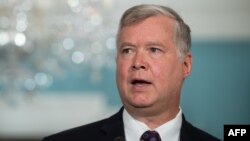Pyongyang is likely to reject Washington’s “big deal” approach toward denuclearizing North Korea as indicated by signals the country has been sending through missile launch preparations, said experts.
U.S. Special Representative Steve Biegun laid out President Donald Trump’s approach toward denuclearizing North Korea at a conference held by the Carnegie Endowment for International Peace on Monday, saying, “We are not going to do denuclearization incrementally.”
Biegun also said sanctions imposed on North Korea will not be lifted until North Korea achieves complete denuclearization.
Washington took an all-or-nothing approach or “big deal” approach toward North Korea’s denuclearization when it began its negotiations last year but gradually shifted to a phased, incremental approach, which is favored by Pyongyang, until the Hanoi summit between Trump and North Korean leader Kim Jong Un.
And weeks before the Hanoi summit, Biegun seemed to suggest in a speech at Stanford University that the U.S. would pursue a step-by-step approach toward achieving agreements made at the Singapore summit last June.
Now, the U.S. has resumed its initial “big deal” position, and Biegun said last month’s Hanoi summit faltered because North Korea asked the U.S. to lift “basically all the sanctions” while offering to dismantle “a portion of their nuclear program.”
Scott Snyder, director of the U.S.-Korea policy program at the Council of Foreign Relations, said the Hanoi summit revealed the U.S. has reverted to its original position.
“It turns out that going for a ‘big deal’ almost brought the U.S. back to its initial negotiating position,” said Snyder. “And it raised the bar in terms of what both the U.S. was willing to give to Kim Jong Un, but also in terms of what the U.S. was expecting from Kim Jong Un.”
Biegun also said that North Korea’s chemical and biological weapons “would be unacceptable” at the Carnegie conference.
Robert Manning, a senior fellow at the Atlantic Council, said North Korean leader Kim Jong Un will not accept the U.S. position.
“Kim has been clear and consistent from his first meeting with (Chinese President) Xi (Jinping) in Beijing that North Korea wants to move forward in a ‘phased synchronous process,’” said Manning. The leaders first met in March 2018 before the first inter-Korean summit was held in April.
“Pyongyang will not accept the idea they give up everything, trust the U.S. and then they get some benefit,” Manning said. “It is too asymmetrical.”
Evans Revere, acting assistant secretary at the State Department’s Bureau of East Asian and Pacific Affairs during the George W. Bush administration, said, “Pyongyang will reject U.S. efforts to pursue a ‘big deal’ requiring North Korea to give up the entirety of its nuclear weapons and related weapons of mass destruction program” because it considers them “the key to the survival of the regime.”
Revere said North Korea will consider giving up its nuclear weapons only when the current level of pressure increases to an “existentially overwhelming array of sanctions and pressure.”
He continued, “The current sanctions and other measures have not reached the level necessary to compel the shift we seek. It remains to be seen whether the Trump administration will be able to muster the diplomatic, political and moral leadership necessary to achieve the end it seeks.”
Since the Hanoi summit breakdown, movements have been detected around North Korea’s missile facilities suggesting the country is not living up to its commitments made at the first summit and possibly preparing to launch a missile.
Commercial satellite images showed North Korea rebuilding the Sohae Satellite Launching Station at Tongchang-ri, which Pyongyang began to dismantle after the first summit with the U.S. in Singapore.
There were also movements around the Samundong facility that suggest preparations may be underway for a test missile launch.
Experts see these activities as North Korea signaling its refusal to accept the U.S. position.
“Kim Jong Un is sending a warning to Washington that he’s prepared to resume satellite launches if there’s no agreement on lifting sanctions in exchange for some measures toward denuclearization,” said Gary Samore, the White House coordinator for arms control and weapons of mass destruction during the Obama administration.
Robert Gallucci, chief U.S. negotiator during the 1994 North Korean nuclear crisis, said North Korea is expressing “its unhappiness over the position taken by the U.S. at the Hanoi summit” which was rejecting its offer to dismantle the Yongbyon nuclear facility in exchange for receiving sanctions relief from the U.S.
Christopher Hill, a chief negotiator with North Korea during the George W. Bush administration, said he would be surprised if North Korea would fire a missile, but because “all the president’s men are getting less patient,” firing a missile would be “the end of this diplomatic phase.”
Lee Jo-eun, Ahn So-young contributed to this report which originated with the VOA Korean Service.








